
Title:
Outcomes of Private Schooling in 21st Century Britain.
Authors:
Francis Green, Jake Anders, Morag Henderson, and Golo Henseke. Journal of Social Policy, 49 (4): 724-743.
What’s it about?
Private schools themselves have tax advantages due to their charitable status, in return for which they have an obligation to provide a public benefit. One form of claimed public benefit is the suggestion that private schools inculcate a community-service orientation in their pupils.
This paper is the first to study whether privately educated people contribute more positively in their early adult life to the community through participation in local groups, unpaid volunteering and charitable giving, when compared to state educated people. This paper also investigates the role of private schools in raising the pay of privately educated young adults, and in affecting their chances of downward social mobility.
Methodology
Researchers used the ‘Next Steps’ cohort study of people born 1989 – 1990 who were followed from teenage to early adulthood to study their school type and then their career advancement and weekly pay.
To measure if and how often participants positively contributed to community, researchers examined three external outcomes: 1) attending meetings of local groups/voluntary organisations, 2) doing unpaid voluntary work/ giving unpaid help to others, and 3) charitable giving/fundraising.
The socio-economic background of participants was taken into consideration.
What are the findings?
- There was no statistically significant difference in the extent to which privately and state educated people contribute public benefit to the community.
- Privately educated people are paid on average 17 percent more at an early career stage (age 25) compared to state educated people.
- People that attend private schools are also 12 percentage points less likely to experience downward mobility, compared to state educated people.
Some but not all of the personal benefits could be accounted for by the higher qualifications gained through their schooling.
What are the limitations of this research?
The study was unable to account for other potential external positive effects attending a private school may offer, such as being less likely to engage in crime. Also, the study did not cover bursaries and the lending of facilities, which are potential public benefits. Finally, the study was unable to account for the reputational and resource differences between private schools.
Explained by: Ingrid Lam, student on a summer placement at Durham University.



